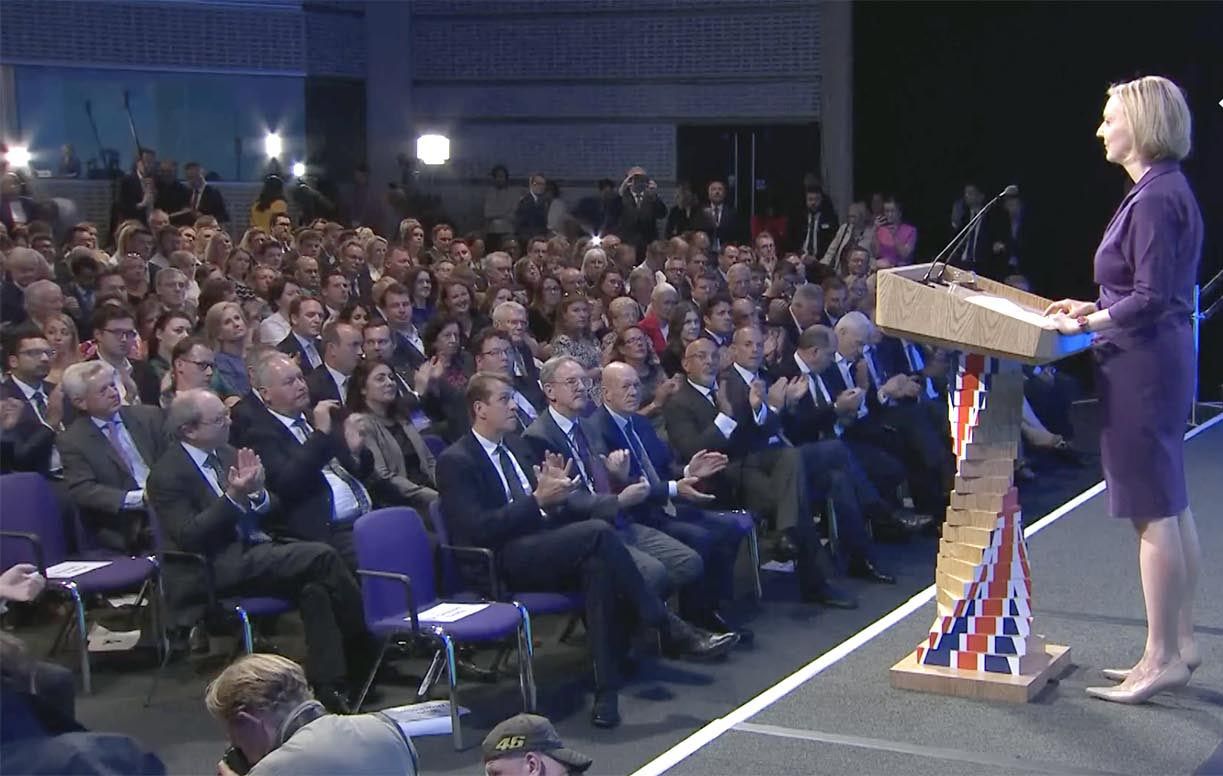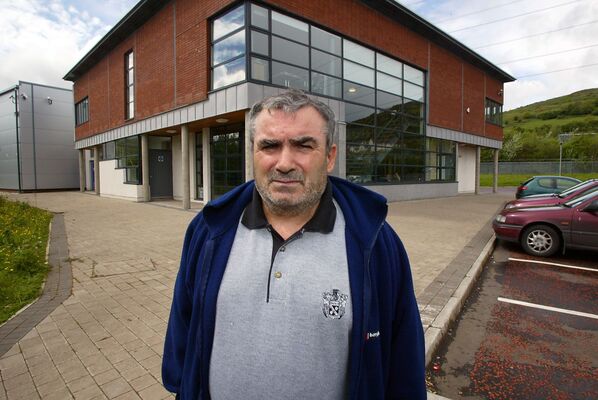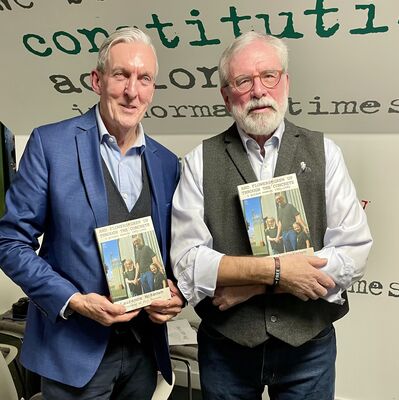LIZ Truss is now the leader of the Conservative Party and British Prime Minister. No real surprise there. She is the fourth leader of the Tories in six years. And as each has tried and failed to reshape Britain to a post-Brexit world Tory government policy – especially under Johnson – has shifted further and further to the right.
If Truss’s rhetoric during the election contest is to be believed this trend will increase on her watch. The challenges facing Truss are huge. While some arise from the war in Ukraine, most are a consequence of the Brexit referendum in 2016 and of policies she promoted while in government.
The devastating impact of Brexit on the British economy has been enormous. There is a shortage of essential workers in agriculture, in the health service and elsewhere in the British economy. The trade deals with non-EU countries that Truss has trumpeted as compensating for Brexit have had little effect. The NHS is unable to meet the demands being placed upon it. The miles-long lorry queues in Kent are evidence of Brexit’s failure. And there is now the cost of living crisis pushing oil and gas and food prices up to unimaginable levels and driving many citizens deeper into poverty.
So far Truss has refused to outline her policies to meet these challenges. We know that she is for a tougher stance against refugees and is an advocate of the Rwanda policy of sending them to Africa. We know that she wants to scrap Britain’s link with the European Convention on Human Rights, a key element of the Good Friday Agreement. We know that she is for tax cuts that will only benefit the wealthy. In essence, we know that she is from the Boris Johnson mould of incompetent politics and is set on continuing these.
When it comes to Ireland Truss doesn’t care. Any more than Johnson did. She has indicated a willingness to back the DUP demand for unilaterally triggering Article 16 of the Withdrawal Agreement with the EU. This would see the British breach international law and suspend those elements of the Protocol which they and their unionist allies don’t like. Earlier this year Truss introduced the Northern Ireland Protocol Bill which, if passed by the British Parliament, would also allow individual Ministers to scrap the Protocol. The Bill is due in the British Lords after the summer recess.
I will meet with Chris Heaton-Harris tomorrow and will make it clear that his first priority must be getting an executive up and running. Workers, families and small businesses need our help now. There can be no more delays.
— Michelle O’Neill (@moneillsf) September 7, 2022
The EU has repeatedly claimed that the British have refused to engage in any serious way in negotiations on the Protocol. This approach will continue under Truss, as will the chaos and confusion that has marked successive Conservative governments for over a decade. The likely consequences of this for the North – and for the island of Ireland and indeed for Scotland – do not look good. But many people’s eyes will be opened. More and more will realise that British government policy has always been dictated by what is in the British – English – interest. Ireland’s interest will never be served by London.
Our response must be to challenge this at every opportunity. The British government has no mandate in Ireland. Only the people of our island have the right to govern ourselves. The sooner the better. No matter what else happens on her watch with Truss’s selection we are another British PM closer to that day.
Derry Chieftain’s Walk back after Covid hiatus
TRIBUTE: The last Chieftain’s Walk in Derry was in 2019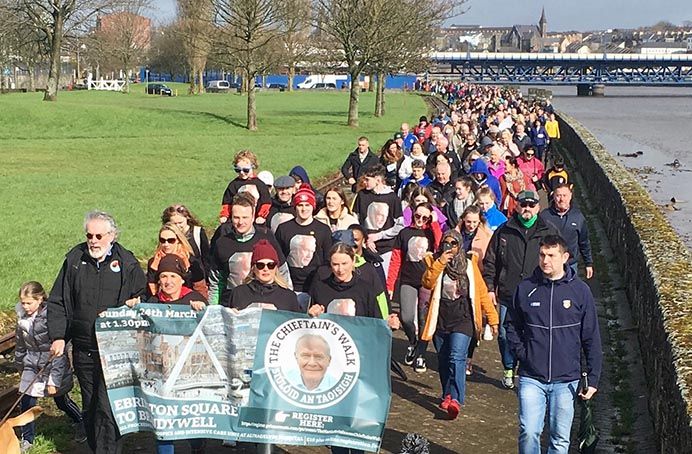
THE Chieftains Walk will be on Sunday, September 18 at 1pm in Derry. It is in memory of Martin McGuinness. So why not join us and Martin’s family? The walk is organised by the Martin McGuinness Peace Foundation. The foundation was established in September 2019, two years after Martin’s death.
The objects of the Foundation are to celebrate the life and achievements of Martin McGuinness, as a leader, a political activist and an international statesperson. The Foundation is established for charitable purposes only and in particular to carry out charitable activities for the public benefit in the areas of:
• The advancement of reconciliation, conflict resolution, unity and peace building - locally, nationally and internationally.
• Community empowerment.
• The advancement of human rights.
• The advancement of equality, inclusivity and diversity.
Since its inception the Foundation has organised a number of events around reconciliation as well as an online concert marking Martin’s 70th birthday.
The Foundation also organises annual events which include the Chieftain’s Walk, a Gaelic games blitz and a fly-fishing competition. This year the Foundation, in recognition of Martin’s passion about the importance of education and employment, has introduced a bursary scheme to help people build better futures for themselves and their families.
The Chieftain’s Walk has been disrupted over the last few years due to Covid restrictions, but this year, with restrictions lifted, the Foundation is looking forward to seeing the return of the hundreds of people who have previously participated in the walk, joining us as we remember our Chieftain.
The proceeds of the Chieftain’s Walk will go to help support the work of the Foundation and I want to encourage everyone to sign up at www.register.enthuse.com/ps/event/ChieftainsWalk2022
The route of the walk will be from Martin’s home, down Westland Street, along Rossville Street, William Street, Waterloo Place, Guildhall Square, Shipquay Street, around the Diamond, up Bishop Street and on to the Derry Walls via Stable Lane. The walk will then proceed around the walls in an anti-clockwise route, coming off at Magazine Street, proceeding through Butcher Gate and down Fahan Street, and out through Rossville Street and the Lecky Road to the Long Tower Centre.
If you live in New York or you happen to be there on September 18, you can play your part by joining in the New York Chieftain’s Walk, assembling at the Irish Hunger Memorial in Battery Park City at 10am on Sunday, September 18.
You may also want to attend the inaugural Martin McGuinness Peace Foundation Dinner in the Manhattan Manor on the evening of September 21. You will be very welcome. Details of the New York walk are available on the Foundation’s Website and social media platforms. admin@martinmcguinnesspeacefoundation.org
Máire memories
Máire Comerford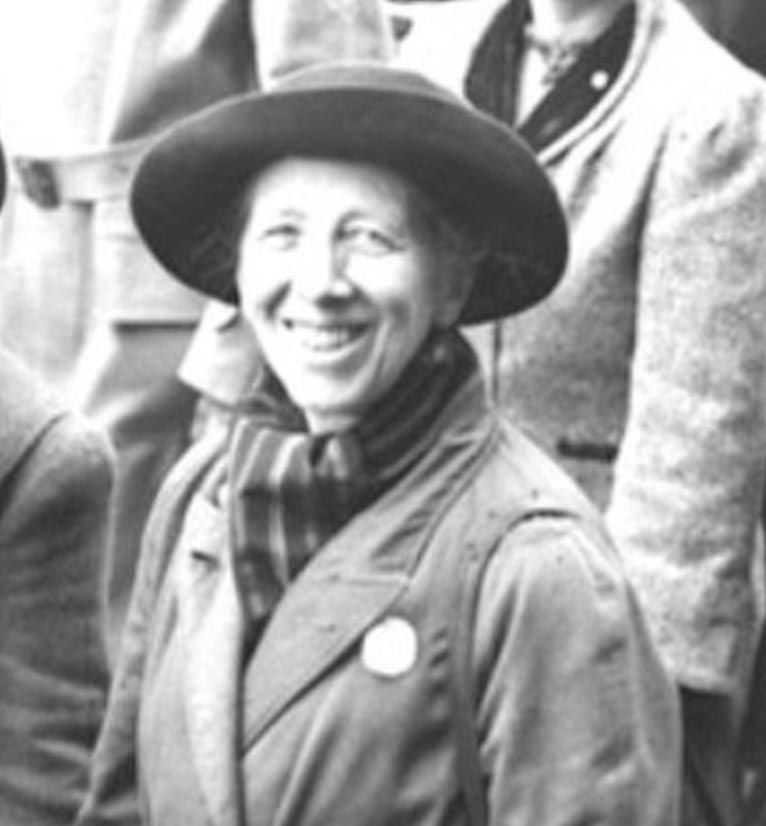
THIS is not a book review. It is a book recommendation. On Dangerous Ground is a memoir by Máire Comerford, edited by Hilary Dully, with an introduction by Margaret Ward. It was recently published by Lilliput. It is required reading for all aspiring republican revolutionaries and students, particularly of the period from 1916 to the 1920s. From revolution to counter-revolution. From the Proclamation of 1916 to partition and civil war.
Máire became a republican activist in 1916. She joined Cumann na mBan and Sinn Féin and she had a full role in many of the events which followed the Rising. She remained an unrepentant republican up to her death in 1982 and kept up a keen involvement in the struggle during all this time. Máire befriended Rita O’Hare, Danny Morrison and other activists of our time. Danny gave the oration at Máire’s funeral. She had hoped to have her memoir published in her life time and she had deposited a version of this in UCD in the 1970s.
But it was never published until now. Hilary Dully has done outstanding work editing and including additional material from Máire’s UCD archive. It is to Hilary’s great credit and the support of her husband, Joe Comerford, Máire’s loyal and devoted nephew, that On Dangerous Ground is published now, almost forty years after Máire’s death. But it is also timely in this the Decade of Centenaries.
This is because it is a republican activist’s account of what happened during the revolutionary phase and then in particular during the period when the Truce was arranged and the Treaty talks were established in London. The sad slippage into civil war and the outworkings of the manipulation of some Irish leaders by London is graphically chronicled. Máire was in the Four Courts when it was bombarded and later inside the Hamman Hotel when it was burning. She experienced the counter-revolution.
There are many fascinating aspects to this wonderful book, including Máire’s own back ground and political development. The footnotes on their own are fascinating. But for me its strength is in Máire’s understanding of the counter-revolution, of partition and how it was connived. It is also a rare recording of the role of a republican woman and her sisters in our struggle. Well done, Máire. And well done, Hilary.

